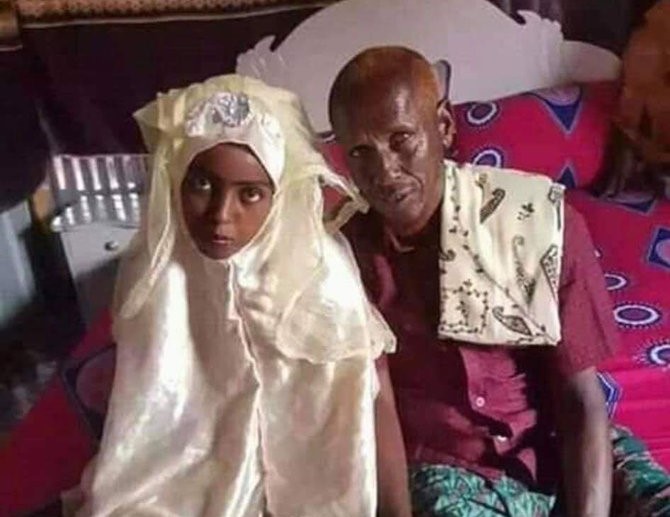Child marriage on the rise in Horn of Africa as drought crisis intensifies

GOOBJOOG NEWS|NAIROBI: Girls as young as twelve are being forced into child marriage and Female Genital Mutilation (FGM) at “alarming rates” in the Horn of Africa, as the most severe drought in forty years pushes families to the edge – warns UNICEF.
In the regions of Ethiopia worst affected by the drought, child marriage has on average more than doubled in the space of one year, according to UNICEF analysis. The number of children at risk of dropping out of school across Ethiopia, Kenya and Somalia, due to the impact of the crisis, has tripled within three months – leaving vast numbers of adolescent girls at greater danger of a number of child protection risks, including undergoing FGM and being forced into marriage.
Across the Horn of Africa, families are facing desperate choices to survive as drought, driven by climate change, dries up water sources and kills livestock, and the domino effect of the war in Ukraine exacerbates spiraling food and fuel prices.
More than 1.8 million children are in desperate need of treatment for life-threatening severe acute malnutrition in the region, with 213,000 people now judged to be at risk of famine in Somalia, according to the Famine Early Warning Network. Growing numbers of parents or caregivers are marrying off girls to secure dowries to help support the rest of the family, to have one less mouth to feed, or in an attempt to help the bride enter a better-off household.
“We are seeing alarming rates of child marriage and FGM across the Horn of Africa – with some destitute families arranging to marry off girls as young as twelve to men more than five times their age,” says Andy Brooks, UNICEF’s Regional Child Protection Advisor for Eastern and Southern Africa.
“Child marriage and FGM end childhoods – driving girls out of school and leaving them more vulnerable to domestic violence and a lifetime of poverty. The figures we have do not capture the magnitude of the problem: large swathes of the Horn of Africa have no specialist facilities where cases can be reported. This is a children’s crisis, and we urgently need more funding to scale up our response in Ethiopia, Kenya and Somalia – not only to save lives in the short-term but to protect them in the long-term.”
Data on child marriage and FGM is limited, due to a lack of reporting and services in the region. UNICEF’s analysis of available government data and humanitarian assessments found:
Across the Horn of Africa region, increasing numbers of girls are in danger of leaving school as the crisis deepens, putting them at higher risk of child marriage and FGM. The number of children at risk of dropping out of school in Ethiopia, Kenya and Somalia due to the impact of the drought has tripled in the space of three months – from 1.1. million to an estimated 3.3 million children.
In an assessment in Somaliland in January, almost a quarter of people interviewed reported a rise in gender-based violence (GBV) due to drought, including child marriage, domestic violence, and sexual violence, with increases of more than 50 per cent in some locations.
Another assessment of humanitarian needs in Puntland in February found that child marriage accounted for 59 per cent of cases reported to service providers, many of which also involved FGM.
The war in Ukraine is accelerating the crisis. Somalia alone once imported 92 per cent of its wheat from Russia and Ukraine, but supply lines are now blocked. Skyrocketing food prices also mean families cannot afford to buy basic staples.
SOMALIA
Child Marriage Story
Asha (not her real name) is 16. She is the eldest of five siblings. Her mother is single and has a very modest wage. Inflation and the loss of value of the Somali shilling are worsening their already precarious economic situation.
Asha’s younger brother, who is 14, is a bus conductor. His daily income supports the family. One day, the bus owner – aged in his forties – proposed marriage to Asha and she was forcibly married.
The mother said, “This is the only source of income we depend on. If I miss this opportunity, I won’t have any other option. I know that my daughter is not old enough to marry, but this is better for her and also for my family. He is a good man and he is able to feed her enough.”
Asha said, “I was not ready for marriage these coming years. Even a teacher who left the school had already proposed to me, but I refused because I wanted to finish my primary education at least. Now the plans have entirely changed and my mom forced me to marry an old man who is not my choice and age. But my mother said he is good for our family. Though I am not still a mother, I am a wife and I lost my education.”
The mother believes she has done the best for both her daughter and her entire family. “My daughter is in the hands of a capable man…she is taking care of her family…and we depend on her for support.”
UNICEF is working to eliminate child marriage in Somalia, including by working with civil society organisations to initiative challenging conversations, and confront harmful practices and beliefs, with traditional and religious leaders. Youth engagement has also led to a positive mentoring process between young people, survivors, and children vulnerable to abuse, designed to help prevent child marriage.
UNICEF advocates for strong child rights legislation in line with the UN Convention on the Rights of the Child (UNCRC). Attempts in the past two years by some lawmakers to reduce the age of a child to 15yrs, and therefore legalize child marriage, remain a threat to children.